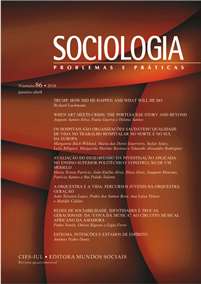Arte y crisis: sobre el caso portugués y no sólo
DOI:
https://doi.org/10.7458/SPP20188611860Palabras clave:
Portugal, fiscal crisis, the arts, cinema, popular music, literatureResumen
Este artículo se focaliza en cómo el arte en Portugal ha lidiado con la crisis económica durante los años del rescate financiero (2011-2014). La metodología de este trabajo se basa en una muestra que toma en consideración diversas áreas como la literatura, las artes plásticas y visuales, la música y las artes escénicas. El artículo pone de manifiesto tres formas diferentes, pero complementarias, en las que el arte y la sociedad han interactuado y se han desarrollado durante estos años. La primera de esa formas hace referencia al posicionamiento político directo de los artistas, a través de sus trabajos y de sus actuaciones. La segunda es la presencia de la crisis, como tema de fondo, en muchas de las creaciones artísticas de esta época. Y la tercera es la forma en la que la crisis ha alumbrado nuevas perspectivas y formas de entender ciertos temas de la imaginación artística portuguesa, destacando la importancia de las identidades colectivas y la autorreflexividad. Así, el caso portugués sugiere cuán prometedora puede ser la toma en consideración de las dimensiones culturales y artísticas a la hora de explicar sociológicamente determinados procesos sociales.Descargas
Archivos adicionales
Publicado
2017-12-18
Número
Sección
Articles
Licencia
Los autores que publican en esta revista concuerdan con los siguientes términos:
a. Los autores conservan los derechos de autor y conceden a la revista el derecho de la primera publicación, con el trabajo simultáneamente licenciado sobre la Licencia Creative Commons Attribution que permite el reparto del trabajo con reconocimiento de la autoría y publicación inicial en esta revista.
b. Los autores tienen autorización para asumir contratos adicionales separadamente para la distribución no-exclusiva de la versión publicada en esta revista (ej: publicar en archivo virtual digital institucional o como capítulo de libro), con reconocimiento de la autoría y publicación inicial en esta revista.



